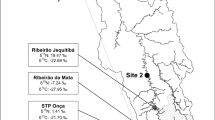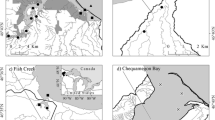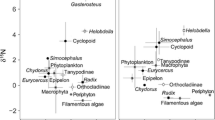Abstract
Historically, anthropogenic fixed nitrogen has been purposely increased to benefit food production and global development. One consequence of this increase has been to raise concentrations of nitrogen in aquatic ecosystems. To evaluate whether nitrogen pollution promotes changes in the estimates of niche space of fish communities, we examined 16 sites along a Brazilian river basin highly impacted by anthropogenic activities, especially discharge of domestic and industrial sewage from a region with more than 5 million inhabitants. We analysed the carbon (δ13C) and nitrogen (δ15N) isotope ratios of fish species and both autochthonous (periphyton) and allochthonous (course and fine particulate organic matter) basal food resources. To estimate the magnitude of nitrogen pollution, we measured the nitrate and ammonium concentrations at each site. Sampling was conducted in the dry and wet seasons to evaluate the influence of seasonality. Nitrogen pollution generally increased estimates of niche space, and seasonality influenced only the niche estimates of fish communities from polluted sites. In addition, isotopic analyses of nitrogen polluted sites yielded unrealistic estimates of trophic positioning (detritivores at the top of the food web). We conclude that changes in niche space estimates reflect both alterations in baseline isotopic values and differential trophic behaviour among fishes. Our study suggests that under conditions of high pollution, other factors appear to influence isotopic estimates of niche, such as isotopically distinct sources that have not been sampled, and/or differences in δ15N turnover rates between fish tissue and basal resources, creating isotopic baselines that are challenging to interpret.







Similar content being viewed by others
Availability of data and material
The datasets generated during and/or analysed during the current study are available from the corresponding author on reasonable request.
References
Adeyemo OK (2003) Consequences of pollution and degradation of Nigerian aquatic environment on fisheries resources. Environmentalist 23:297–306. https://doi.org/10.1023/B:ENVR.0000031357.89548.fb
Alonso MB, de Carvalho DR, Alves CBM et al (2019) Changes in trophic characteristics of two fish species of Astyanax (Teleostei: Characidae) in response to aquatic pollution. Zoologia 36:1–12. https://doi.org/10.3897/zoologia.36.e30445
Alonso MB, de Carvalho DR, Alves CBM, Pompeu PS (2020) Trophic structure of a fish assemblage in a reference condition river located in a polluted watershed. Environ Biol Fishes 103:1437–1452. https://doi.org/10.1007/s10641-020-01033-z
Alves CBM, Pompeu PS (2010) A fauna de peixes da bacia do rio das Velhas no final do século XX. In: Alves CBM, Pompeu PS (eds) Peixes do rio das Velhas: passado e presente. ARGVMENTVM, Belo Horizonte
Anderson C, Cabana G (2005) δ15N in riverine food webs: effects of N inputs from agricultural watersheds. Can J Fish Aquat Sci 62:333–340. https://doi.org/10.1139/f04-191
Anderson C, Cabana G (2006) Does δ15N in river food webs reflect the intensity and origin of N loads from the watershed? Sci Total Environ 367:968–978. https://doi.org/10.1016/j.scitotenv.2006.01.029
Atlas das Águas (2009) Impacto ambiental relevante identificado na bacia do rio das Velhas. Águas impactadas por esgotos domésticos e efluentes industriais. http://www.atlasdasaguas.ufv.br/velhas/impacto_ambiental_relevante_identificado_na_bacia_do_rio_das_velhas.html. Accessed on 15 Jan 2019
Barrie A, Prosser SJ (1996) Automated analysis of light-element stable isotopes by isotope ratio mass spectrometry. In: Boutton TW, Yamasaki S-I (eds) Mass spectrometry of soils. Marcel Dekker, Inc, pp 1–46
Bearhop S, Adams CE, Waldron S et al (2004) Determining trophic niche width: a novel approach using stable isotope analysis. J Anim Ecol 73:1007–1012. https://doi.org/10.1111/j.0021-8790.2004.00861.x
Bolnick DI, Svanback R, Araujo MS, Persson L (2007) Comparative support for the niche variation hypothesis that more generalized populations also are more heterogeneous. Proc Natl Acad Sci 104:10075–10079. https://doi.org/10.1073/pnas.0703743104
Busst GMA, Britton JR (2018) Tissue-specific turnover rates of the nitrogen stable isotope as functions of time and growth in a cyprinid fish. Hydrobiologia 805:49–60. https://doi.org/10.1007/s10750-017-3276-2
Cabana G, Rasmussen JB (1996) Comparison of aquatic food chains using nitrogen isotopes. Proc Natl Acad Sci U S A 93:10844–10847
Camargo JA, Alonso Á (2006) Ecological and toxicological effects of inorganic nitrogen pollution in aquatic ecosystems: a global assessment. Environ Int 32:831–849. https://doi.org/10.1016/j.envint.2006.05.002
Camargo JA, Alonso A, Salamanca A (2005) Nitrate toxicity to aquatic animals: a review with new data for freshwater invertebrates. Chemosphere 58:1255–1267. https://doi.org/10.1016/j.chemosphere.2004.10.044
Carvalho DR, Castro D, Callisto M et al (2015) Isotopic variation in five species of stream fishes under the influence of different land uses. J Fish Biol 87:559–578. https://doi.org/10.1111/jfb.12734
Castro DMP, de Carvalho DR, Pompeu PDS et al (2016) Land use influences niche size and the assimilation of resources by benthic macroinvertebrates in tropical headwater streams. PLoS One 11:e0150527. https://doi.org/10.1371/journal.pone.0150527
CBH Rio das Velhas (2015) Plano diretor de recursos hídricos da Bacia Hidrográfica do Rio das Velhas. Resumo executivo, Belo Horizonte
DeBruyn AMH, Rasmussen JB (2002) Quantifying assimilation of sewage-derived organic matter by riverine benthos. Ecol Appl 12:511–520. https://doi.org/10.1890/1051-0761(2002)012[0511:QAOSDO]2.0.CO;2
de Carvalho DR, de Castro DMP, Callisto M et al (2017) The trophic structure of fish communities from streams in the Brazilian Cerrado under different land uses: an approach using stable isotopes. Hydrobiologia 795:199–217. https://doi.org/10.1007/s10750-017-3130-6
de Carvalho D, Flecker A, Alves C et al (2019a) Trophic responses to aquatic pollution of native and exotic livebearer fishes. Sci Total Environ 681:503–515. https://doi.org/10.1016/j.scitotenv.2019.05.092
de Carvalho DR, de Castro DMP, Callisto M et al (2019b) Stable isotopes and stomach content analyses indicate omnivorous habits and opportunistic feeding behavior of an invasive fish. Aquat Ecol 53:365–381. https://doi.org/10.1007/s10452-019-09695-3
de Carvalho D, Alves C, Flecker A et al (2020a) Using δ15N of periphyton and fish to evaluate spatial and seasonal variation of anthropogenic nitrogen inputs in a polluted Brazilian river basin. Ecol Ind 115:106372. https://doi.org/10.1016/j.ecolind.2020.106372
de Carvalho DR, Alves CBM, Moreira MZ, Pompeu PS (2020b) Trophic diversity and carbon sources supporting fish communities along a pollution gradient in a tropical river. Sci Total Environ 738:139878. https://doi.org/10.1016/j.scitotenv.2020.139878
DeNiro M, Epstein S (1981) Influence of diet on the distribution of nitrogen isotopes in animals. Geochim Cosmochim Acta 45:341–351
Fenech C, Rock L, Nolan K et al (2012) The potential for a suite of isotope and chemical markers to differentiate sources of nitrate contamination : a review. Water Res 46:2023–2041. https://doi.org/10.1016/j.watres.2012.01.044
Finlay JC, Kendall C (2007) Stable isotope tracing of temporal and spatial variability in organic matter sources to freshwater ecosystems. Stable Isotope Tracing of Organic Matter Sources and Food Web Interactions in Watersheds 2:283–333
Flaherty EA, Ben-David M (2010) Overlap and partitioning of the ecological and isotopic niches. Oikos 119:1409–1416. https://doi.org/10.1111/j.1600-0706.2010.18259.x
France RL (1995) Carbon-13 enrichment in benthic compared to planktonic algae: foodweb implications. Mar Ecol Prog Ser 124:307–312
Galloway JN, Cowling EB (2002) Reactive nitrogen and the word: 200 years of change. Ambio 31:64–71. https://doi.org/10.2307/4315217
Hadwen WL, Bunn SE (2005) Food web responses to low-level nutrient and 15N-tracer additions in the littoral zone of an oligotrophic dune lake. Limnol Oceanogr 50:1096–1105. https://doi.org/10.4319/lo.2005.50.4.1096
Hamilton SK, Lewis WM (1992) Stable carbon and nitrogen isotopes in algae and detritus from the Orinoco River floodplain, Venezuela. Geochim Cosmochim Acta 56:4237–4246. https://doi.org/10.1016/0016-7037(92)90264-J
Hesslein RH, Hallard KA, Ramlal P (1993) Replacement of sulfur, carbon, and nitrogen in tissue of growing broad whitefish (Coregonus nasus) in response to a change in diet traced by δ34S, δ13C, and δ15N. Can J Fish Aquat Sci 50:2071–2076. https://doi.org/10.1139/f93-230
Hill WR, Fanta SE, Roberts BJ (2008) 13C dynamics in benthic algae: effects of light, phosphorus, and biomass development. Limnol Oceanogr 53:1217–1226. https://doi.org/10.4319/lo.2008.53.4.1217
IBGE (2018) Estimativas de população. In: Inst. Bras. Geogr. e Estatística. https://www.ibge.gov.br/estatisticas-novoportal/sociais/populacao/9103-estimativas-de-populacao.html?=&t=resultados. Accessed on 26 Feb 2019
IGAM - Instituto Mineiro de Gestão das águas (2017) Monitoramento de qualidade das águas. In: Monit. Qual. das Águas. http://portalinfohidro.igam.mg.gov.br/monitoramento-de-qualidade-das-aguas. Accessed on 16 Jan 2019
Jackson AL, Inger R, Parnell AC, Bearhop S (2011) Comparing isotopic niche widths among and within communities: SIBER—Stable Isotope Bayesian Ellipses in R. J Anim Ecol 80:595–602. https://doi.org/10.1111/j.1365-2656.2011.01806.x
Jepsen DB, Winemiller KO (2002) Structure of tropical river food webs revealed by stable isotope ratios. Oikos 96:46–55
Jones L, Provins A, Holland M et al (2014) A review and application of the evidence for nitrogen impacts on ecosystem services. Ecosyst Serv 7:76–88
Junk WJ, Bayley PB, Sparks RE (1989) The flood pulse concept in river floodplain systems. In: Dodge DP (ed) Proceedings of the international large river symposium (LARS). Canadian Special Publication of Fisheries and Aquatic Sciences, pp 110–127
Kendall C (1998) Tracing nitrogen sources and cycling in catchments. In: Kendall C, McDonnell JJ (eds) Isotope tracers in catchment hydrology. Elsevier BV, pp 519–576
Layman CA, Arrington DA, Montaña CG, Post DM (2007a) Can stable isotope ratios provide for community-wide measures of trophic structure? Ecology 88:42–48. https://doi.org/10.1890/0012-9658(2007)88[42:CSIRPF]2.0.CO;2
Layman CA, Quattrochi JP, Peyer CM, Allgeier JE (2007b) Niche width collapse in a resilient top predator following ecosystem fragmentation. Ecol Lett 10:937–944. https://doi.org/10.1111/j.1461-0248.2007.01087.x
Loomer HA, Oakes KD, Schiff SL et al (2015) Use of stable isotopes to trace municipal wastewater effluents into food webs within a highly developed river system. River Res Appl 31:1093–1100. https://doi.org/10.1002/rra.2826
Machado ATM, Alves CBM, Callisto M (2008) Projeto Manuelzão: metodologia e resultados. In: Diniz LFM (ed) Lisboa AH, Goulart; EMA. Projeto Manuelzão. A história da mobilização que começou em torno de um rio. Instituto Guaicuy - SOS Rio das Velhas, Belo Horizonte, pp 39–54
McCutchan JH Jr, Lewis WM Jr (2001) Seasonal variation in stable isotope ratios of stream algae. Verhandlungen Des Int Verein Limnol 27:3304–3307
McCutchan JH, Lewis WM, Kendall C, McGrath CC (2003) Variation in trophic shift for stable isotope ratios of carbon, nitrogen, and sulfur. Oikos 102:378–390. https://doi.org/10.1034/j.1600-0706.2003.12098.x
McIntyre PB, Flecker AS (2006) Rapid turnover of tissue nitrogen of primary consumers in tropical freshwaters. Oecologia 148:12–21. https://doi.org/10.1007/s00442-005-0354-3
Middelburg JJ (2014) Stable isotopes dissect aquatic food webs from the top to the bottom. Biogeosciences 11:2357–2371. https://doi.org/10.5194/bg-11-2357-2014
Minagawa M, Wada E (1984) Stepwise enrichment of 15N along food chains: Further evidence and the relation between δ15N and animal age. Geochim Cosmochim Acta 48:1135–1140. https://doi.org/10.1016/0016-7037(84)90204-7
Newsome SD, del Rio CM, Bearhop S, Phillips DL (2007) A niche for isotopic ecology. Front Ecol Environ 5:429–436. https://doi.org/10.1890/060150.01T
Nikolenko O, Jurado A, Borges AV et al (2018) Isotopic composition of nitrogen species in groundwater under agricultural areas: a review. Sci Total Environ 621:1415–1432. https://doi.org/10.1016/j.scitotenv.2017.10.086
O’Leary MH (1981) Carbon isotope fractionation in plants. Phytochemistry 20:553–567. https://doi.org/10.1016/0031-9422(81)85134-5
Peterson BJ, Fry B (1987) Stable isotopes in ecosystem studies. Annu Rev Ecol Syst 18:293–320. https://doi.org/10.1146/annurev.es.18.110187.001453
Philippsen JS, Hauser M, Benedito E (2015) Isotopic niches of sympatric native and exotic fish species in a Neotropical floodplain. An Acad Bras Cienc 87:825–833. https://doi.org/10.1590/0001-3765201520140266
Phillips DL, Inger R, Bearhop S et al (2014) Best practices for use of stable isotope mixing models in food-web studies. Can J Zool 92:823–835. https://doi.org/10.1139/cjz-2014-0127
Post DM (2002) Using stable isotopes to estimate trophic position: models, methods, and assumptions. Ecology 83:703. https://doi.org/10.2307/3071875
Prado MR, de Carvalho DR, Alves CBM et al (2020) Convergent responses of fish belonging to different feeding guilds to sewage pollution. Neotrop Ichthyol 18:e190041. https://doi.org/10.1590/1982-0224-2019-0045
Rabalais NN (2002) Nitrogen in aquatic ecosystems. AMBIO A J Hum Environ 31:102–112. https://doi.org/10.1579/0044-7447-31.2.102
Riera P (1998) δ15N of organic matter sources and benthic invertebrates along an estuarine gradient in Marennes-Oléron Bay (France): implications for the study of trophic structure. Mar Ecol Prog Ser 166:143–150. https://doi.org/10.3354/meps166143
Santoro R, Bentivoglio F, Carlino P et al (2014) Sensitivity of food webs to nitrogen pollution: a study of three transitional water ecosystems embedded in agricultural landscapes. Transitional Waters Bull 8:84–97. https://doi.org/10.1285/i1825229Xv8n1p84
Savage C, Elmgren R (2004) Macroalgal (Fucus vesiculosus) δ15N values trace decrease in sewage influence. Ecol Appl 14:517–526
Schubert PR, Karez R, Reusch TBH, Dierking J (2013) Isotopic signatures of eelgrass (Zostera marina L.) as bioindicator of anthropogenic nutrient input in the western Baltic Sea. Mar Pollut Bull 72:64–70. https://doi.org/10.1016/j.marpolbul.2013.04.029
Smith VH (2003) Eutrophication of freshwater and coastal marine ecosystems a global problem. Environ Sci Pollut Res 10:126–139. https://doi.org/10.1065/espr2002.12.142
Smith VH, Tilman GD, Nekola JC (1999) Eutrophication: impacts of excess nutrient inputs on freshwater, marine, and terrestrial ecosystems. Environ Pollut 100:179–196. https://doi.org/10.1016/S0269-7491(99)00091-3
Taylor KG, Owens PN, Batalla RJ, Garcia C (2008) Sediment and contaminant sources and transfers in river basins. In: Owens PN (ed) Sustainable management of sediment resources, pp 83–135
Thorp JH, Delong MD (1994) The riverine productivity model: an heuristic view of carbon sources and organic processing in large river ecosystems. Oikos 70:305. https://doi.org/10.2307/3545642
Vannote RL, Minshall GW, Cummins KW et al (1980) The river continuum concept. Can J Fish Aquat Sci 37:130–137. https://doi.org/10.1139/f80-017
Vitousek PM, Aber JD, Howarth RW et al (1997) Human alteration of the global nitrogen cycle: sources and consequences. Ecol Appl 7:737–750. https://doi.org/10.1890/1051-0761
Wang Y, Liu D, Richard P, Di B (2016) Selection of effective macroalgal species and tracing nitrogen sources on the different part of Yantai coast, China indicated by macroalgal δ15N values. Sci Total Environ 542:306–314. https://doi.org/10.1016/j.scitotenv.2015.10.059
Winemiller KO (2004) Floodplain river food webs: generalizations and implications for fisheries management. In: Welcomme RL, Petr T (eds) Proceedings of the Second International Symposium on the Management of Large Rivers for Fisheries. RAP Publication 2004/16, pp 285–309
Yeakel JD, Bhat U, Elliott Smith EA, Newsome SD (2016) Exploring the isotopic niche: isotopic variance, physiological incorporation, and the temporal dynamics of foraging. Front Ecol Evol 4:1–16. https://doi.org/10.3389/fevo.2016.00001
Acknowledgements
We thank the Agência Peixe Vivo and the Comitê de Bacia Hidrográfica do Rio das Velhas for project financial support and the Projeto Manuelzão for the logistical support. Thanks to Aline J. Grossi (Federal University of Lavras—UFLA) and Luiza Hoehne (Federal University of Minas Gerais—UFMG) for the support on processing of samples. Thanks to the Benthos Ecology Laboratory (UFMG) and the Laboratory of Fish Ecology (UFLA) who assisted in the processing of samples and infrastructure.
Funding
This work was supported by the Agência Peixe Vivo and Comitê de Bacia Hidrográfica do Rio das Velhas—CBH Rio das Velhas (grant/contract number 001/2015). Débora Reis de Carvalho received research support from Coordenação de Aperfeiçoamento de Pessoal de Nível Superior—Brazil (Finance code 32004010017P3 and 88881.190508/2018–01). Paulo Santos Pompeu received research support from Conselho Nacional de Desenvolvimento Científico e Tecnológico (grant number 303548/2017–7) and Fundação de Amparo à Pesquisa do Estado de Minas Gerais (grant number PPM-00237/13).
Author information
Authors and Affiliations
Contributions
DRC, JPS, ASF, and PSP originally formulated the idea, DRC, CBMA, MZM and PSP developed methodology, CBMA conducted fieldwork, DRC processed the samples; MZM conducted the stable isotope analyses, DRC performed statistical analyses and wrote the manuscript, and JPS, ASF, CBMA, MZM and PSP reviewed and edited the manuscript.
Corresponding author
Ethics declarations
Conflict of interest
The authors declare that they have no known competing financial interests or personal relationships that could have appeared to influence the work reported in this paper.
Ethical approval
The methodology for this study was approved by the Ethics committee of the Universidade Federal de Lavras (Federal University of Lavras). Ethics approval number: 070/15.
Additional information
Communicated by Craig A. Layman .
Supplementary Information
Below is the link to the electronic supplementary material.
Rights and permissions
About this article
Cite this article
de Carvalho, D.R., Sparks, J.P., Flecker, A.S. et al. Nitrogen pollution promotes changes in the niche space of fish communities. Oecologia 197, 485–500 (2021). https://doi.org/10.1007/s00442-021-05029-z
Received:
Accepted:
Published:
Issue Date:
DOI: https://doi.org/10.1007/s00442-021-05029-z




